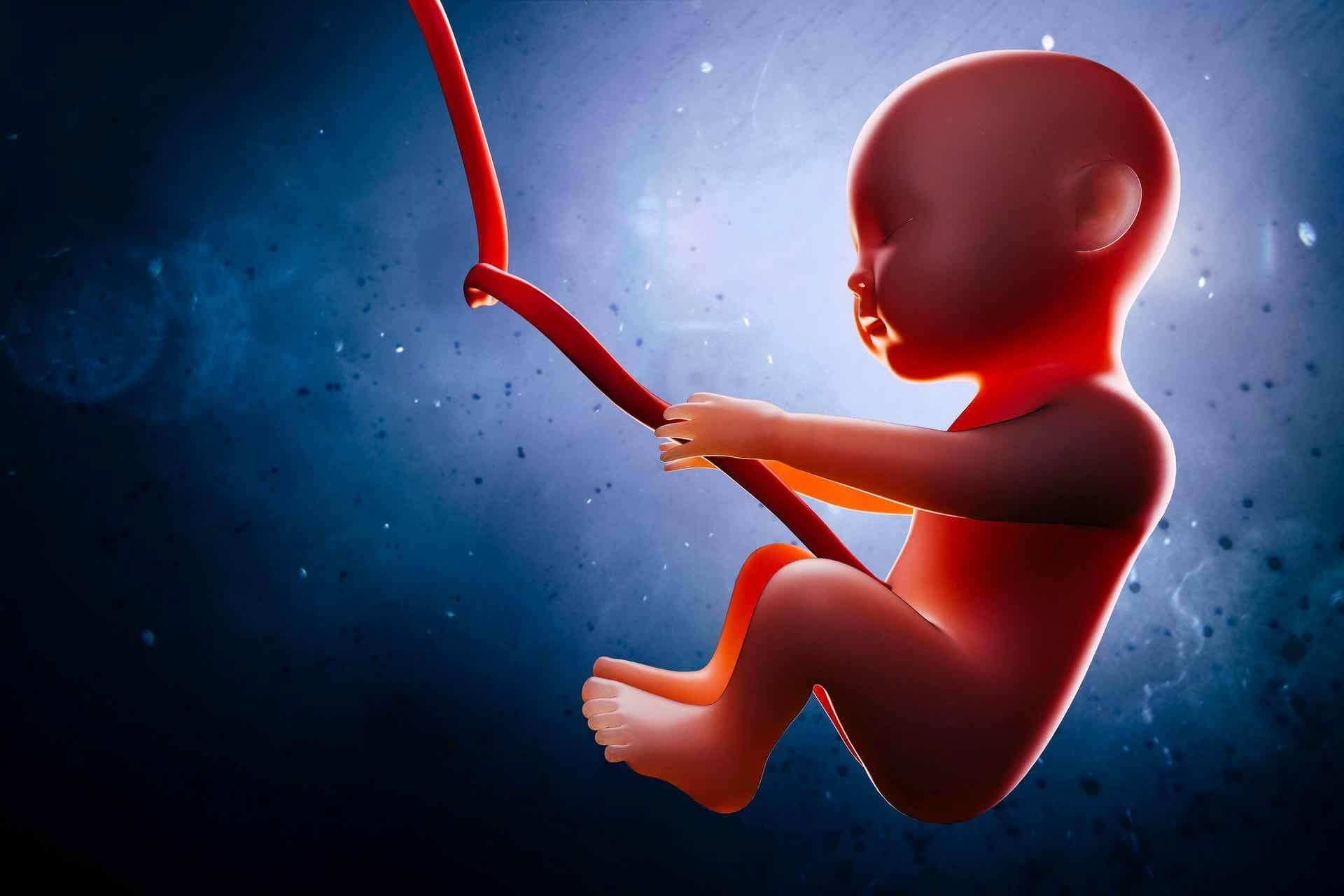Fetal Hiccups During Pregnancy: What You Need to Know

Fetal hiccups during pregnancy are one of those sensations in the mother’s belly that may be strange at first, but that actually corresponds to the proper development of the baby. In this case, it’s the diaphragm that grows and contracts to ensure the proper functioning of the respiratory system at the time of birth.
Normally, there’s no need to consult a doctor, since it’s something natural and isn’t usually accompanied by bothersome symptoms. If you’ve ever heard about fetal hiccups during pregnancy and would like to know a little more about them, we’ve prepared the following article just for you. Read on!
How are fetal hiccups described?
Many mothers describe it as a brief sensation that comes on suddenly and goes on rhythmically. They’re small movements or “jumps” in some parts of the mother’s belly that are often a cause for concern in the more inexperienced mothers.
In no way do they provoke pain or any other worrisome symptom such as fever or problems with bowel movements. Sometimes, it’s more likely that these alterations correspond to physiological changes during pregnancy, and not to a warning sign that could be mistaken for this sensation.
Find out more: Stimulating Your Baby’s Movement During Pregnancy
Fetal hiccups during pregnancy: why do they occur?

This sensation occurs as a result of active movements of the baby’s diaphragm, which are related to the proper development of this organ, as well as to the need to prepare your child for the demands of the outside world.
Did you know about this muscle? The diaphragm divides the abdominal cavity from the thoracic cavity, and is located just below the lungs and heart. Below it, we find several organs such as the liver, some parts of the intestine and the spleen.
Outside the uterus, when this organ contracts, it’s able to facilitate the expansion of the thoracic cavity and allow air to enter the lungs thanks to a physical phenomenon. When it relaxes, the air comes out naturally to start another respiratory cycle. This whole process is called pulmonary ventilation.
Of course, inside the mother, future babies don’t breathe air. Instead, amniotic fluid is constantly swallowed and expelled to protect the fetus and ensure the proper development of certain organs.
Should I be concerned?
Fetal hiccups are a natural consequence of the baby’s development. They’re not related in any way to a pathology. So, it’s something normal that all mothers will perceive at some point during pregnancy.
In general, this sensation usually appears around the 20th week of pregnancy, which is why new mothers are usually very excited about it. If you’re in this category, don’t worry!
Sometimes fetal hiccups can be mistaken for false or Braxton Hicks contractions. The latter are painless, brief, irregular and spontaneous in onset. This curious name refers to the fact that they don’t actually indicate the onset of labor. They correspond to the “preparation” of the uterus for this event.
Fetal hiccups during pregnancy: when to go to the doctor?

Fetal hiccups don’t require emergency or scheduled medical intervention as they’re not pathological. However, some mothers (especially first-time mothers) may have questions about how to differentiate this sensation from other pregnancy abnormalities.
In general, it’s advisable to see a doctor in case there are signs or symptoms of certain diseases that could compromise the proper development of the baby. Examples include absence of fetal movements at an advanced stage of pregnancy, and fever or severe abdominal pain associated with fetal hiccups.
In routine medical consultations it’s common for the physician to perform a brief physical examination and an obstetric ultrasound to assess the development of the future baby. This is the ideal time to ask about fetal hiccups, which, as we’ve said, isn’t a pathological event.
Discover more: 15 useful tips for first-time moms
Your baby is getting ready!
Few things are as satisfying during pregnancy as feeling your baby’s development through movements. These make you feel their strength and desire to leave when the time is right. So, far from generating you worry, you should share these moments of happiness with loved ones.
It’s advisable to document this and other moments in a personal diary, videos or photographs to remember fondly in the future. These are unique and unrepeatable moments, so make the most of them.
Fetal hiccups during pregnancy are one of those sensations in the mother’s belly that may be strange at first, but that actually corresponds to the proper development of the baby. In this case, it’s the diaphragm that grows and contracts to ensure the proper functioning of the respiratory system at the time of birth.
Normally, there’s no need to consult a doctor, since it’s something natural and isn’t usually accompanied by bothersome symptoms. If you’ve ever heard about fetal hiccups during pregnancy and would like to know a little more about them, we’ve prepared the following article just for you. Read on!
How are fetal hiccups described?
Many mothers describe it as a brief sensation that comes on suddenly and goes on rhythmically. They’re small movements or “jumps” in some parts of the mother’s belly that are often a cause for concern in the more inexperienced mothers.
In no way do they provoke pain or any other worrisome symptom such as fever or problems with bowel movements. Sometimes, it’s more likely that these alterations correspond to physiological changes during pregnancy, and not to a warning sign that could be mistaken for this sensation.
Find out more: Stimulating Your Baby’s Movement During Pregnancy
Fetal hiccups during pregnancy: why do they occur?

This sensation occurs as a result of active movements of the baby’s diaphragm, which are related to the proper development of this organ, as well as to the need to prepare your child for the demands of the outside world.
Did you know about this muscle? The diaphragm divides the abdominal cavity from the thoracic cavity, and is located just below the lungs and heart. Below it, we find several organs such as the liver, some parts of the intestine and the spleen.
Outside the uterus, when this organ contracts, it’s able to facilitate the expansion of the thoracic cavity and allow air to enter the lungs thanks to a physical phenomenon. When it relaxes, the air comes out naturally to start another respiratory cycle. This whole process is called pulmonary ventilation.
Of course, inside the mother, future babies don’t breathe air. Instead, amniotic fluid is constantly swallowed and expelled to protect the fetus and ensure the proper development of certain organs.
Should I be concerned?
Fetal hiccups are a natural consequence of the baby’s development. They’re not related in any way to a pathology. So, it’s something normal that all mothers will perceive at some point during pregnancy.
In general, this sensation usually appears around the 20th week of pregnancy, which is why new mothers are usually very excited about it. If you’re in this category, don’t worry!
Sometimes fetal hiccups can be mistaken for false or Braxton Hicks contractions. The latter are painless, brief, irregular and spontaneous in onset. This curious name refers to the fact that they don’t actually indicate the onset of labor. They correspond to the “preparation” of the uterus for this event.
Fetal hiccups during pregnancy: when to go to the doctor?

Fetal hiccups don’t require emergency or scheduled medical intervention as they’re not pathological. However, some mothers (especially first-time mothers) may have questions about how to differentiate this sensation from other pregnancy abnormalities.
In general, it’s advisable to see a doctor in case there are signs or symptoms of certain diseases that could compromise the proper development of the baby. Examples include absence of fetal movements at an advanced stage of pregnancy, and fever or severe abdominal pain associated with fetal hiccups.
In routine medical consultations it’s common for the physician to perform a brief physical examination and an obstetric ultrasound to assess the development of the future baby. This is the ideal time to ask about fetal hiccups, which, as we’ve said, isn’t a pathological event.
Discover more: 15 useful tips for first-time moms
Your baby is getting ready!
Few things are as satisfying during pregnancy as feeling your baby’s development through movements. These make you feel their strength and desire to leave when the time is right. So, far from generating you worry, you should share these moments of happiness with loved ones.
It’s advisable to document this and other moments in a personal diary, videos or photographs to remember fondly in the future. These are unique and unrepeatable moments, so make the most of them.
All cited sources were thoroughly reviewed by our team to ensure their quality, reliability, currency, and validity. The bibliography of this article was considered reliable and of academic or scientific accuracy.
- Cabanyes J. El comportamiento fetal: una ventana al neurodesarrollo y al diagnóstico temprano. Rev Pediatr Aten Primaria 2014;16(63).
This text is provided for informational purposes only and does not replace consultation with a professional. If in doubt, consult your specialist.








